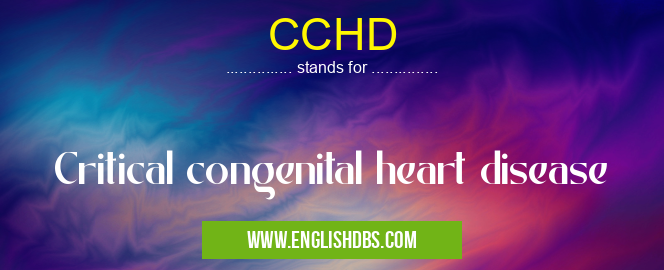What does CCHD mean in DISEASES
Critical congenital heart disease (CCHD) is a general term used to describe a group of serious and potentially life-threatening structural abnormalities in the heart of an infant. These defects affect how blood flows through the heart, ultimately leading to oxygen-poor and oxygen-rich blood mixing inside the body and not being adequately supplied to vital organs. As CCHD is often asymptomatic at birth, it is important for parents to be informed about this condition so they can seek timely medical attention should their child present any signs or symptoms associated with it. In this article, we will explore CCHD in greater detail – from its causes and types to diagnosis and management.

CCHD meaning in Diseases in Medical
CCHD mostly used in an acronym Diseases in Category Medical that means Critical congenital heart disease
Shorthand: CCHD,
Full Form: Critical congenital heart disease
For more information of "Critical congenital heart disease", see the section below.
Definition
Critical congenital heart disease (CCHD) refers to eight major defects of the heart present at birth that severely interfere with normal circulation of blood within the body. The primary abnormalities involve problems with the structure or function of one or more valves, walls, or chambers of the heart. It may also involve a combination of related defects including narrowed pulmonary arteries, ventricular septal defect (VSD), coarctation of the aorta, transposition of great vessels, and tetralogy of Fallot.
Symptoms
The signs and symptoms associated with CCHD may vary depending on severity and type; however, common symptoms include rapid breathing/respiration rate; difficulty breathing; lack of energy/tiredness; cold hands/feet/extremities; poor appetite; excessive sweating; seizure activity if oxygen levels are low; abnormal skin coloring (cyanosis); poor weight gain or failure to thrive; fast or irregular heartbeat (arrhythmia); accumulate fluid in abdomen or chest cavity due to congestive cardiac failure (CCF).
Diagnosis
Diagnosing CCHD requires specialized expertise, as some forms occur without obvious visible signs during physical examination. To further investigate suspected cases, medical professionals may order various tests such as electrocardiography (ECG), echocardiogram (ultrasound imaging test of the heart), chest X-ray, magnetic resonance imaging (MRI), computed tomography (CT) scan among others. Screening for critical congenital heart disease is done using pulse oximetry which measures oxygen saturation level in a baby's blood by monitoring light absorption from two different sites on their foot and hand.
Treatment
Treatment options for CCHD depend on its type and severity but can generally involve both medical intervention and open-heart surgery. Depending on individual circumstances some infants may require short-term treatments such as medications like diuretics, antiarrhythmics drugs and anticoagulants while others may need life-long treatment including pacemaker implantation or cardiac catheterization procedures like angioplasty or stenting for symptomatic relief.
Essential Questions and Answers on Critical congenital heart disease in "MEDICAL»DISEASES"
What is critical congenital heart disease?
Critical Congenital Heart Disease (CCHD) is a group of serious birth defects that affect the structure of a baby’s heart and how it works. These heart defects can cause oxygen-poor blood to circulate in the body instead of oxygen-rich blood, leading to severe health issues or even death.
What are the signs and symptoms of CCHD?
The most common signs and symptoms of CCHD include difficulty breathing, rapid heartbeat, pale skin, low energy levels, poor feeding, and cyanosis (blue-tinged skin).
Are newborns screened for CCHD?
Yes. All states in the US now require newborns to be screened for CCHD before leaving the hospital. This screening test involves pulse oximetry (measuring oxygen levels in your baby's red blood cells) while your newborn baby sleeps.
How is CCHD treated?
Treatment depends on the type and severity of the defect but usually involves medications, surgeries, cardiac catheterization procedures or transplants if necessary.
What are some common types of CCHD?
Some common types of CCHD includes Tetralogy of Fallot, Transposition of Great Arteries (TGA), Double Outlet Right Ventricle (DORV), Hypoplastic Left Heart Syndrome (HLHS), Pulmonary Atresia, Coarctation of Aorta, Truncus Arteriosus and Tricuspid Atresia.
Who is at risk for having a baby with CCHD?
Anyone can have a baby with CCHD; however there are certain factors that could increase your risk such as mothers over age 35 or exposure to certain drugs or alcohol during pregnancy. Additionally, if there is a family history of congenital heart disease then this increases the risk as well.
Is there anything I can do during pregnancy to lower my baby’s risk for developing CCHD?
There are several lifestyle changes you can make during pregnancy that may reduce your baby’s risk such as quitting smoking and drinking alcohol, eating a healthy diet full of fruits and vegetables and taking prenatal vitamins as recommended by your doctor. Additionally avoiding any drug use is important for reducing risks associated with birth defects like critical congenital heart disease.
How does my doctor diagnose whether or not my newborn has critical congenital heart disease?
Your doctor will use both physical exams as well as imaging tests such as echocardiography (ultrasound) or MRI scans to diagnose whether or not a newborn has critical congenital heart disease. These tests allow doctors to look at the structure and function of the infant's heart so they can determine if there are any abnormalities present.
Can adults get critical congenital heart disease?
While most cases occur in newborn babies due to genetic factors or environmental exposures during pregnancy; adults can also develop critical congenital heart diseases later in life due to infections such as rheumatic fever or illnesses like Kawasaki Syndrome.
Final Words:
Critical congenital heart disease is a group of serious cardiac abnormalities that occur at birth – many without visible symptom - leaving it up to timely screening methods such as pulse oximetry to detect them early before complications set in. While treatments vary depending on each individual case most forms require multi disciplinary interventions involving doctors from different specialties such as pediatric cardiologists, interventional radiologist etc., surgical correction(s) followed by lifelong monitoring which can often give patients an improved qualityof life..
